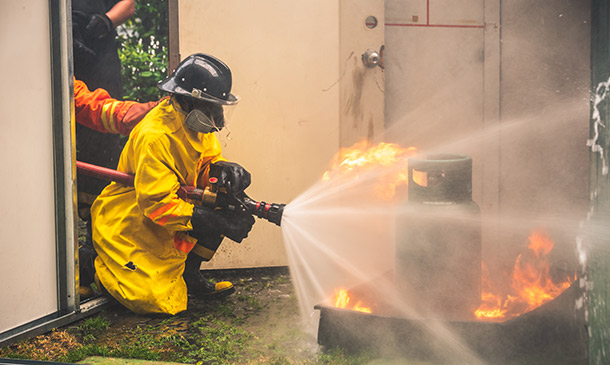Course Overview:
Our Level 2 Electrical and Fire Safety Training equips you with the knowledge and skills you need. This comprehensive program empowers you to navigate electrical systems safely and mitigate fire risks. You’ll master the fundamentals of electricity, including voltage, resistance, and capacitance, while gaining a deep understanding of fire science and fire prevention strategies. Learn to implement effective fire safety measures, conduct risk assessments, and even design safe escape routes.
This course also covers essential firefighting skills and emergency procedures, ensuring you’re prepared to handle any situation. With 24/7 learning assistance and a curriculum designed for all backgrounds, this valuable training not only boosts your career prospects but also gives you peace of mind, knowing you can help create a safer environment.
Enrol our Level 2 Electrical and Fire Safety Training today and take control of your safety and the safety of others.
Key Features of the Course:
- Comprehensive understanding of electrical systems and fire safety
- Ability to implement effective safety precautions
- Knowledge of UK fire safety legislation and compliance
- Skills to conduct fire risk assessments and install safety systems
- Proficiency in managing electrical hazards and emergencies
- Enhanced career prospects in safety-related roles
Who is This Course For?
This course is suitable for a diverse range of individuals, including:
- Professionals working in electrical engineering, construction, or facilities management.
- Safety officers and supervisors responsible for ensuring compliance with fire safety regulations.
- Homeowners and tenants interested in understanding electrical and fire safety measures for personal use.
- Students pursuing careers in engineering, architecture, or related fields.
What You Will Learn:
Throughout this course, you will explore various topics and modules to enhance your understanding of electrical and fire safety. The course covers:
- The basics of electricity, voltage, resistance, capacitance, and capacitors. You will learn how electricity works and how it can be measured and controlled.
- The safety precautions that you need to take when working with or around electrical equipment. You will learn to avoid common electrical hazards such as shocks, burns, fires, and explosions.
- The introduction to fire safety. You will learn the basic concepts of fire science, fire chemistry, fire behaviour, and fire classification.
- The fire safety legislation applies to your workplace or home. You will learn how to comply with the relevant laws and regulations that govern electrical and fire safety.
- The measures of fire safety that you need to implement in your environment. You will learn how to conduct a fire risk assessment, how to install and maintain fire detection and alarm systems, how to use firefighting equipment such as extinguishers and hoses, and how to design and maintain escape routes and exits.
- The fire emergency procedures that you need to follow in case of a fire outbreak. You will learn how to raise the alarm, how to evacuate safely, how to assist others in need, and how to communicate with the emergency services.
Why Enrol in This Course:
Enrolling in this course offers several advantages:
Top-Reviewed Course: Benefit from a course with outstanding reviews and positive feedback from learners worldwide.
Recently Updated Content: Stay updated with the latest industry standards and best practices in electrical and fire safety.
Skills Development: Develop helpful skills that can be immediately applied in emergencies or everyday life.
Requirements:
To make the most of this course, a basic understanding of electrical concepts is recommended. However, no prior experience or technical background is required.
Career Path:
Upon completing this course, you will have gained valuable knowledge for various career opportunities. Some of the professions you can pursue in the United Kingdom, along with their average salaries, include:
-
- Electrical Engineer
- Designs, develops, and maintains electrical systems, ensuring safety and efficiency.
- Average Salary: £40,000 per year
- Fire Safety Officer
- Ensures compliance with fire safety regulations, conducts inspections, and implements fire prevention measures.
- Average Salary: £35,000 per year
- Building Inspector
- Assesses buildings for compliance with safety standards, including electrical and fire safety.
- Average Salary: £30,000 per year
- Safety Consultant
- Advises organisations on best practices for electrical and fire safety, conducting risk assessments and recommending improvements.
- Average Salary: £45,000 per year
- Facilities Manager
- Oversees the maintenance and safety of buildings, ensuring all electrical and fire safety protocols are followed.
- Average Salary: £35,000 per year
- Health and Safety Advisor
- Develops and implements health and safety policies, focusing on electrical and fire safety in the workplace.
- Average Salary: £32,000 per year
- Risk Assessment Specialist
- Conducts thorough risk assessments for electrical and fire hazards, developing strategies to mitigate risks.
- Average Salary: £38,000 per year
- Maintenance Engineer
- Maintains and repairs electrical systems, ensuring they meet safety standards and are free from hazards.
- Average Salary: £30,000 per year
- Compliance Officer
- Ensures that organisations comply with relevant electrical and fire safety regulations and standards.
- Average Salary: £34,000 per year
- Environmental Health Officer
- Monitors and enforces health and safety regulations, including electrical and fire safety, within various environments.
- Average Salary: £32,000 per year
- Electrical Engineer
Certification:
Upon completing the Electrical and Fire Safety Training – Level 2 course, you will be awarded a CPD certificate. This certification is a testament to your expertise and commitment to electrical and fire safety practices.
Enrol in this course today and empower yourself with the skills to promote electrical and fire safety, protect lives, and make a positive impact in your professional and personal spheres.
FAQ
What is electrical and fire safety?
- Electrical and fire safety involves practices and guidelines to prevent electrical hazards and fire risks in various environments, such as homes, workplaces, and public spaces. It includes understanding electrical systems, identifying potential hazards, implementing safety measures, and complying with relevant legislation to protect lives and property.
Which course is best in fire and safety?
- The Electrical and Fire Safety Training – Level 2 course is highly recommended for its comprehensive coverage of both electrical and fire safety topics. This CPD accredited course offers a detailed curriculum, expert guidance, and flexible online learning, making it ideal for professionals and individuals seeking to enhance their safety knowledge.
What is in fire training?
- Fire training typically covers fundamental concepts of fire science, fire chemistry, fire behaviour, and fire classification. It includes practical knowledge on conducting fire risk assessments, installing and maintaining fire detection and alarm systems, using fire fighting equipment, and designing and maintaining escape routes and exits. The training also covers fire safety legislation and emergency procedures for safe evacuation and communication with emergency services.
How do I purchase this Electrical and Fire Safety Training?
-
Click the “Take This Course” button. You can then adjust the course quantity if needed. Now, simply proceed to checkout. Enter your billing information and choose your preferred payment method. Once everything is filled out, click “Complete Purchase”. Welcome aboard! You’ll receive your login credentials via email shortly after purchase. Access the course platform using your login and start learning!
Course Curriculum
- 9 sections
- 9 lectures
- 5 hours total length
-
Introduction and Basics
00:14:00
-
Introduction to Fire Safety
01:18:00
-
Voltage and Resistance
00:22:00
-
Capacitance and Capacitors
00:20:00
-
Safety Precautions
00:27:00
-
Fire Safety Legislation
01:18:00
-
Measures of Fire Safety
00:25:00
-
Fire Emergency: Evacuation Procedures
00:36:00
-
Claim Your Certificate










